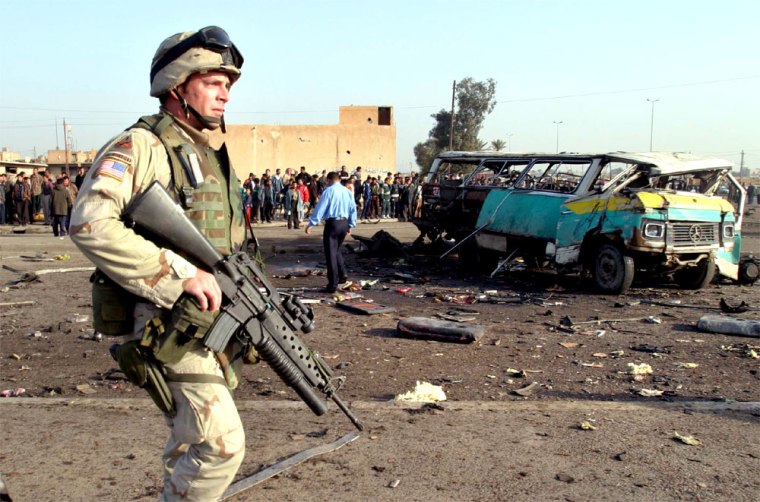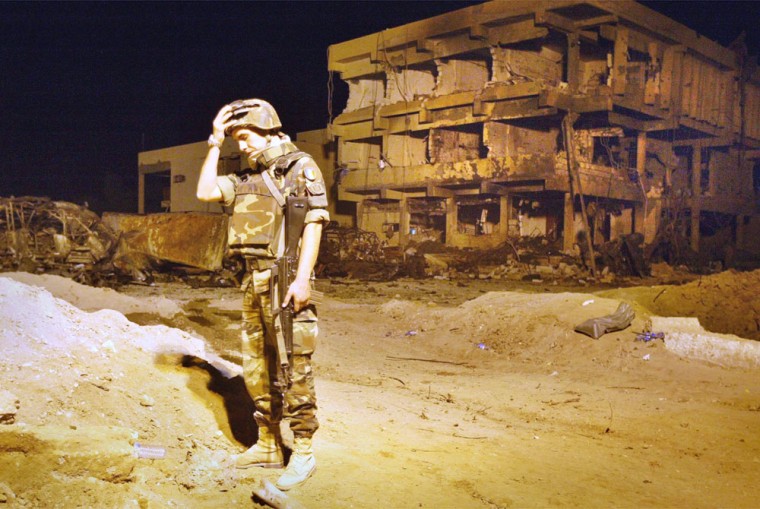Has America turned a corner? In so many ways, on so many disparate topics, this question will hang over the nation in 2004. The question will be applied differently by people of different political persuasions, of course. Yet most Americans share a common desire to see quantifiable, irreversible progress in the many “wars” raging since the attacks of Sept. 11, 2001. For the first time in years, the optimists may have somewhere to hang their hats.
This is a miserable time for tea leaf-reading. So many things remain in flux. Yet there are unmistakable signs of a transition from America's recession-bound, bunker mentality of the past three years to something more hopeful. The economy is growing. Afghanistan is writing a new constitution. Saddam Hussein is in custody, and attacks on American forces are on the wane in Iraq. America’s judicial branch finally is weighing in on the enormous constitutional issues raised by anti-terrorism moves in the wake of 9/11. Al-Qaida, Allah be praised, has not struck again on American soil.
Yet for each ray of hope there hovers a thunderhead nearby. Yes, the economy is growing. But at the same time, global competition is performing surgery without anesthesia on the American manufacturing economy, amputating a factory here, a customer service center there and transplanting them in Asia. The deficit, swollen by the one-two punch of record government spending and record tax cuts in a time of recession, threatens the nation’s longer-term prospects.
In Afghanistan, a constitution is being debated. The U.S.-backed government, however, controls little of the country. Meanwhile, the ousted Taliban and their former guests, al-Qaida, appear to be regrouping in the hinterlands of Pakistan — a nuclear-armed nation whose stability is questionable and which recently has been revealed as the world’s most serious proliferators of nuclear weapons technology. Debates rage in Washington over the seriousness of the blow al-Qaida suffered during its flight from Afghanistan. There is a very real possibility that the diversion of national effort to Iraq in 2003 gave the terrorists the breathing space they needed to recover.
Iraq, too, remains a mixed bag. In spite of Saddam’s capture, the handover of sovereignty to the Iraqis remains six months away at least. While attacks on American troops are down in recent weeks, internecine violence between Iraqis is surging, raising fears of a civil war.

Add to that continuing questions about the claims made by the Bush administration (and its ally, the Tony Blair government in Britain) about the threat Iraq purportedly represented, and it is far too early to begin talking about Operation Iraqi Freedom in the past tense.
Beyond the pale
Still, it is too simplistic to reduce the world, as too many politicians do, to a combination of pocketbook issues and wars in the Middle East. As 2003 ends, with the political acrimony of an election year looming ahead, it is worth catching one’s breath and considering what has gone right.
In spite of all the qualifiers, the capture of Saddam is a victory for the United States and Britain. Saddam confounded six elected leaders of these nations (Thatcher, Major and Blair in Britain: Bush, Clinton and Bush (W) in America). He was not Hitler or Stalin or even Pol Pot. But his removal is an absolute good.
Osama bin Laden’s continued existence on this planet remains a major American failure. Yet the actions ascribed to him in 2003 appeared to be increasingly desperate and self-defeating.
The bombing of an apartment block in Riyadh, Saudi Arabia, was a terrific act of self-destruction, leading the Saudis, at least, to begin to direct their innate repression toward those funding and encouraging terrorism. Monetary gifts to Saudi mosques, a major source of al-Qaida funding in the past, have been outlawed.
Similarly, the attacks on Jewish targets in Istanbul also backfired, killing more Muslims than infidels and strengthening America’s hand in dealings with its influential and powerful Turkish ally. The car bombings in Iraq, too, invariably claim far more innocent Iraqi Muslims than “crusaders.”
There are other hopeful developments in the world, too.
- Libya, after months of secret diplomacy with the United States and Britain, agreed to the complete dismantling of its WMD programs. This is important not only because of Libya’s own history of terrorist actions, but because of the clues that will flow from a full accounting of the origins of items like centrifuges and chemical weapons kilns.
- On several occasions this past year, China used its diplomatic clout constructively. This broke with decades of precedent that generally confined China to pedantic lectures about “non-interference in other nation’s sovereign affairs.” In the summer, Chinese pressure helped bring North Korea back to the negotiating table in the continuing standoff over its nuclear weapons. Later in the year, China played a key role in brokering a deal between the European antiwar powers and the United States and Britain that allowed for passage of a U.N. resolution that “blessed” the U.S.-led occupation of Iraq.
- Elements within Israel’s Likud Party, the governing party of Prime Minister Ariel Sharon, are talking openly about the need for Israel to divest itself of huge swaths of the West Bank, including many Jewish settlements there and in Gaza. While this may lead nowhere quickly, the breaking of this taboo opens the door to the kind of national unity coalitions (with the more dovish parties of the left) that will be needed to reach a balanced solution someday.
- The world’s longest-running war, a civil conflict between Sudan’s Islamic government and Christian and animist groups in the south of the country, came to a negotiated end. For two generations now, Africa’s largest nation has produced a steady stream of horrors, from famine to epidemics to massacres. Behind each and every one was the war and the cynical misappropriation of the nation’s scarce resources that it encouraged.
None of these trends is written in stone. Iraq could erupt in civil war. China could turn bully. Sudan’s war could flare anew. Most important, al-Qaida could settle the debate over its viability in one, horrible act. Similarly, I could go on about world issues where the trends are hardly favorable: Russia's slide toward authoritarianism, Zimbabwe's self-destructive xenophobia. I could go on (and will in columns next year).
For now, let it be enough to say that no nation, no president, no army, no international institution can hope to contain all the horrors that humankind visits upon itself. But as 2004 dawns, in contrast to 2002 or 2003, there at least appears to be reason to hope that some of these horrors are receding.
Michael Moran is senior correspondent for MSNBC.com.
